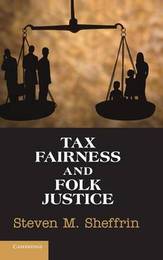
|
Tax Fairness and Folk Justice
Hardback
Main Details
| Title |
Tax Fairness and Folk Justice
|
| Authors and Contributors |
By (author) Steven M. Sheffrin
|
| Physical Properties |
| Format:Hardback | | Pages:264 | | Dimensions(mm): Height 231,Width 155 |
|
| Category/Genre | Economics
Taxation |
|---|
| ISBN/Barcode |
9780521195621
|
| Classifications | Dewey:336.2 |
|---|
| Audience | | Professional & Vocational | |
|---|
| Illustrations |
12 Tables, unspecified; 2 Line drawings, unspecified
|
|
Publishing Details |
| Publisher |
Cambridge University Press
|
| Imprint |
Cambridge University Press
|
| Publication Date |
31 October 2013 |
| Publication Country |
United Kingdom
|
Description
Why have Americans severely limited the estate and gift tax - ostensibly targeted at only the very wealthy - but greatly expanded the subsidies to low-wage workers through the Earned Income Tax Credit, now the single largest poverty program in the country? Why do people hate the property tax so much, yet seemingly revolt against it only during periods of economic change? Why are some groups of taxpayers more obedient to the tax authorities than others, even when they face the same enforcement regime? These puzzling questions all revolve around perceptions of tax fairness. Is the public simply inconsistent? A sympathetic and unified explanation for these attitudes is based on understanding the everyday psychology of fairness and how it comes to be applied in taxation. This book demonstrates how a serious consideration of 'folk justice' can deepen our understanding of how tax systems actually function and how they can perhaps be reformed.
Author Biography
Steven M. Sheffrin is a Professor of Economics and the Executive Director of the Murphy Institute at Tulane University. He is the author and co-author of several books, including Property Taxes and Tax Revolts (with Arthur O'Sullivan and Terri A. Sexton, Cambridge University Press, 2007) and Rational Expectations, 2nd edition (Cambridge University Press, 1996). His articles have appeared in numerous scholarly journals, including the American Economic Review, the Quarterly Journal of Economics, the Journal of Economic Perspectives, the Review of Economics and Statistics, the National Tax Journal, the Journal of International Economics, the Journal of Finance, the Journal of Monetary Economics, and the International Economic Review. He received his PhD from the Massachusetts Institute of Technology.
Reviews'A fabulous book! Filled with insights on a crucially important, but underexplored, aspect of tax policy. This book should be required reading for anyone interested in the politics or sociology of taxation.' David Gamage, University of California, Berkeley 'Steve Sheffrin brings together insights from social psychology and philosophy to reconcile how economists think about tax fairness with how everyone else does. It is a fascinating ride, well worth taking, that draws on the author's familiarity with modern economics and with the details of tax systems. Sheffrin's argument that many key features of the tax system are best explained through understanding folk justice concepts is compelling and should be taken seriously by all students of taxation.' Joel Slemrod, University of Michigan 'Proposals for tax legislation ideally should reflect an understanding of both academic research and public opinion, but few scholars address the connection between the two. Steven Sheffrin's creative approach, equally respectful of expert analysis and ordinary citizens' views of tax fairness, provides new insights into the elements of successful policy reform.' Joan Youngman, Lincoln Institute of Land Policy '... offers a fresh perspective on many longstanding - and notoriously nettlesome - tax policy questions, and does so in an engaging and accessible style.' Kirk J. Stark, National Tax Journal
|